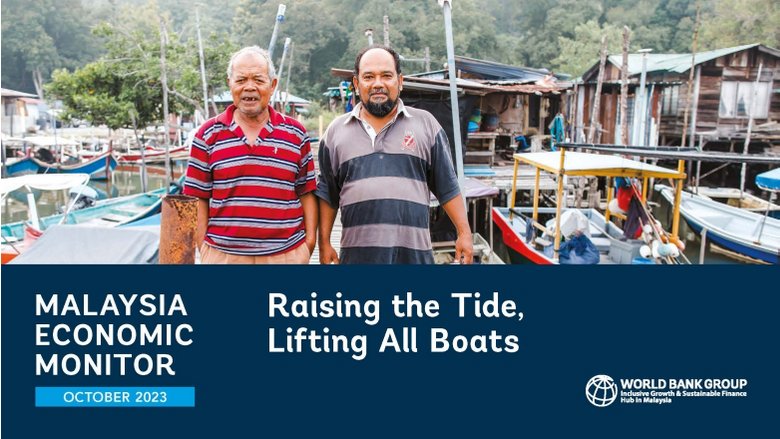KUALA LUMPUR, October 10, 2023 – Malaysia’s economy is projected to expand by 3.9% in 2023 amid subdued external demand but edge up to 4.3% in 2024, as an anticipated global recovery offset a slowdown in China, according to the World Bank Malaysia Economic Monitor: Raising the Tide, Lifting All Boats, launched today.
Malaysia's GDP growth slowed to 2.9% in Q2 2023. Although domestic demand continued to grow, its pace has moderated, and revenue collection is expected to remain relatively low. Therefore, efficiency improvements in expenditure are crucial, especially to refine the efficacy of subsidy measures for those who need it the most. The report recommends a combination of stronger tax collection, reduced blanket subsidies, and more adequate targeted support for those who need it.
"Over the years, Malaysia's taxes, transfers, and subsidies have helped us reduce poverty by a great margin, but income inequality is still high compared to other countries,” said Malaysian Minister of the Economy Rafizi Ramli. “We could get more out of our social programs by targeting them better for the poor and increasing their adequacy. And we could further reduce poverty and inequality by increasing social spending while improving efficiency. Cutting blanket subsidies and improving the targeting of social assistance are the key measures the Government intends to take for better impact on the poor and the vulnerable."
The report examines gaps between the rich and poor in Malaysia, where, despite dramatic declines in poverty over the last 50 years and a narrowing of income gaps among ethnic groups, regional disparities in income and human capital outcomes remain significant. Malaysia's low tax revenues of 12% of GDP, well below the upper-middle-income country average of 18%, leaves less fiscal space for pro-poor and growth-enhancing investments.
To increase fiscal space to meet growing spending and investment needs, Malaysia can strengthen its revenue capacity by enhancing general consumption taxes, personal income tax, and health taxes, streamlining corporate tax incentives, expanding capital gains taxes, and exploring other progressive taxes.
"Malaysia could reduce poverty and inequality and improve its fiscal position by taking a broader view of government spending. This approach aligns with Prime Minister Datuk Seri Anwar Ibrahim's emphasis on a people-centric perspective, embodied in the Madani Economy framework," said World Bank Country Director for Brunei, Malaysia, Philippines, and Thailand Ndiame Diop. “For example, redirecting the 2022 fuel subsidies to strengthen social assistance programs could double poverty reduction while generating 1.6% of GDP in fiscal savings.
Improving the adequacy and targeting of existing social assistance could offset cost-of-living increases by raising consumption taxes or reducing fuel subsidies. In addition, new revenues and cost savings could be channeled into social assistance budgets with short-term benefits in reducing poverty and inequality and long-term gains through investments in education and health. To download the report, visit: https://bit.ly/MEMOct23

